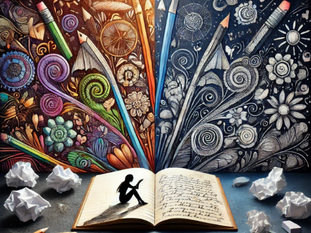
Why I Chose Self-Publishing: Embracing Creative Freedom
Oct 30, 2024
3 min read
1
7
0
Self-publishing is more than just a viable option for many authors; it’s a path to creative freedom and personal fulfillment. While traditional publishing is a dream for many, it doesn’t always fit every author’s unique style or vision.
For me, self-publishing became the clear choice as I faced the reality that my writing might not align with the traditional publishing mold. A lot of factors go into this beyond how strong of a writer you are or how original the story might be.
Let’s start with what traditional publishers are looking for—actually, what literary agents are looking for, since it is now nearly impossible to get published without a literary agent.
To put into context why, it is sort of like they are fisherman out in the deep sea. They reel the fish and sort out the ones worth selling before taking it to market for their patrons (publishers). They have to make sure that the fish is something they can sell—something most people would buy. Or they risk losing money themselves.
Traditional Publishing – The search for an Agent and how to mold the book they want.
Let’s break out of the analogy to go over what Literary Agents are actually looking for.
(If you have further questions about any section, let me know in the comments and I can explained in another post.)
- First and Most importantly is – Quality of Writing and Originality.
o We all know that the market is pretty tapped for completely original ideas. That doesn’t mean it’s not possible! However, even if the framework is similar to another story, Agents want to see original twists and narratives.
- Secondly – Marketability and Platform/Reach.
o We all know that in this day and age a following matters. To Agents it is the first sign of how much work they will need to do when promoting you. If you have no platform, it means a lot more work on their end when they work to get your book out there.
- Thirdly – Professionalism and History.
o They need to assess within just your introduction and query letter if you will have the professionalism and preparedness to be a published author. They need to gage what your ability to take feedback and possibly revisions will be. They also look at your history in this. If you’ve worked with different agents or publishing houses and why you are looking a new representation is a huge focus for them.
- Finally- Author’s commitment and Relationship potential.
o Agents need to know that you are dedicated to your craft and serious about your work. This can be shown through the query letter and synopsis of your work. They use this to also gage whether or not they would be a good fit for working with you long term.
This journey can be both challenging and enlightening. Over the past few years, I’ve received numerous rejection letters. After a while, and a lot of research I realized why I would keep getting these rejections. I will in later post go in depths about my book but for this post I will say that my story doesn’t fit the mold. The market isn’t obvious and I, until now, didn’t have a platform.
In my next post, I’ll offer some examples of what rejections will look like and how to avoid rejection burn-out.
Stay tuned for more updates and insights as I continue this journey and remember that every writer’s path is unique. Embrace your journey and keep pushing forward, no matter the obstacles.
Warm regards,
AJ Eddy
.png)





